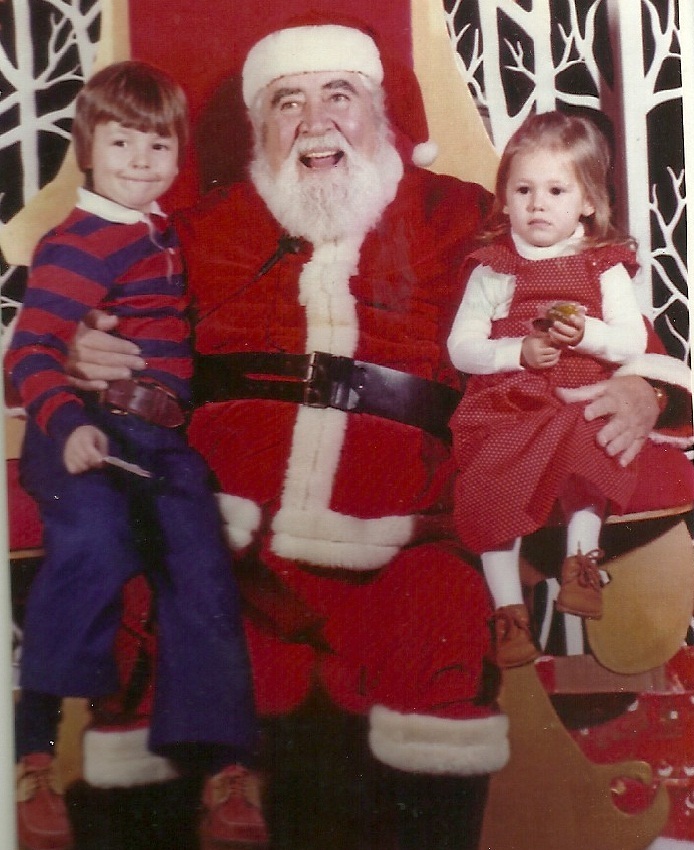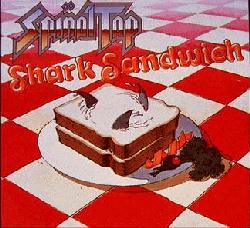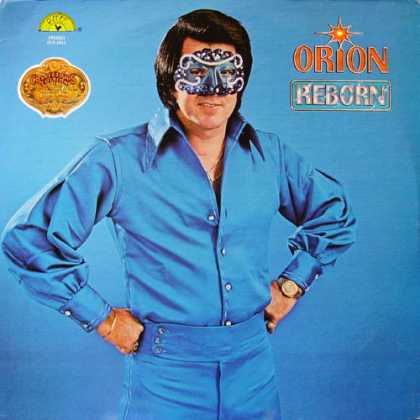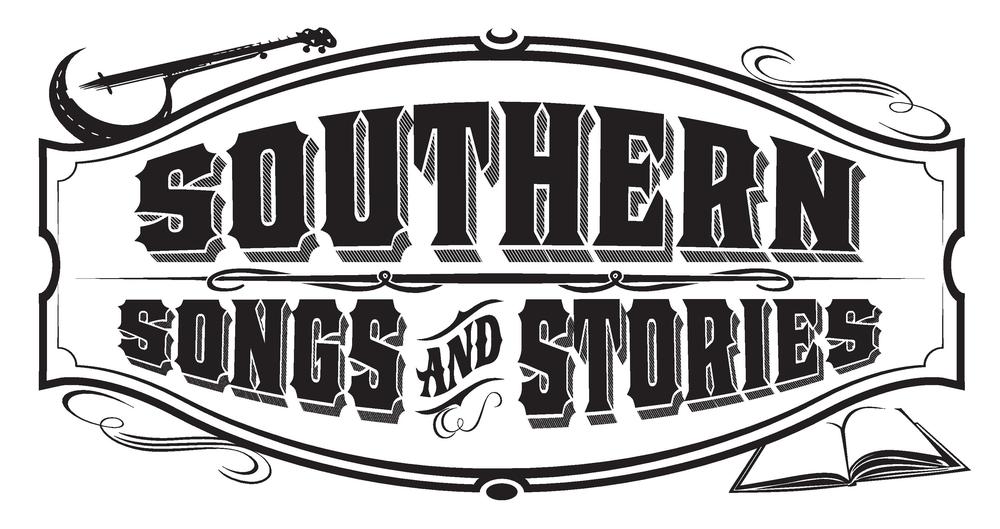We're excited to wade into the technology waters once again and take a DIY turn with interviews and conversations on Google Hangouts. Please leave a comment or connect us through our social media links if you'd like to be a part of the new series of shows or find out more about when they're on air!
Christmas with Joe Kendrick
As a child, Christmas was always a wonderful time of year. I am fortunate to have had a loving, stable family with plenty of food and gifts to go around from day one. When Mom eventually told me that Santa Claus wasn't real, I cried. My sister, however, never bought in to the myth. We are pictured below with the best Santa in history at Gaston Mall in 1976: I was seven, Leigh was two. The previous year, she had refused to sit on Santa's lap.

Some of my fondest memories are of visiting relatives on Christmas Eve. First we went to my Mom's side of the family, where Maw-maw was joined by my two uncles, an aunt and three cousins (all in my oldest uncle's family). We kids would sit at a little card table in the kitchen, away from the adults. After dinner came the excruciating wait for adults to clean up, talk, smoke and generally drag their feet before opening presents. When it was finally time, my cousin Lori and I would jump into the pile of presents and hand them out to everyone: there was only so much anticipation a kid could take.
Soon we would trek a few miles west to my Dad's folks, and enjoy an even more elaborate meal from Grandma. We would then open more presents, but there was none of the anxiety from earlier in the day. Dad was an only child, so there were no cousins clamouring for their first endorphine rush of ripping through wrapping paper. It was just my sister and me; the edges had all been smoothed off, and we could coast now.
As dusk approached, we would drive home, so filled with food and serene with the bounty of presents that I would doze off along the way. The next day was always good, but a bit of an anticlimax.
One thing that was not a big factor in our Christmases was music. Memories of A Charlie Brown Christmas, The Grinch Who Stole Christmas, Rudolph the Red Nosed Reindeer and other shows on TV are there, but I can't recall much about what we heard on the radio. There was no purposeful listening to Vince Guaraldi, The Nutcracker Suite, anything. Perhaps my Dad would rib me if Spike Jones' "All I Want For Christmas Is My Two Front Teeth" came around (he would kid me by saying that a lot), but such recollections simply aren't there.
Music became more and more important to me, and with my experience in radio, I am fortunate to listen to a lot of great Christmas music every year. 2012 has some great offerings, and a good overview from Blurt! Magazine can be found here.
 My favorites from this year include: The Sweetback Sisters' Country Christmas Sing-Along Spectacular, The Bank Cormorants' Madonna & Rose, Sufjan Stevens' Silver & Gold, TriBeCaStan's The Twisted Christmas, The Eastern Sea's First Christmas, An East Nashville Christmas, JD McPherson's "Twinkle (Little Christmas Lights)", Sugar + The Hi Lows' Snow Angel, and last but definitely not least, Crocodiles & The Dum Dum Girls' "Merry Christmas Baby Please Don't Die", pictured on the left.
My favorites from this year include: The Sweetback Sisters' Country Christmas Sing-Along Spectacular, The Bank Cormorants' Madonna & Rose, Sufjan Stevens' Silver & Gold, TriBeCaStan's The Twisted Christmas, The Eastern Sea's First Christmas, An East Nashville Christmas, JD McPherson's "Twinkle (Little Christmas Lights)", Sugar + The Hi Lows' Snow Angel, and last but definitely not least, Crocodiles & The Dum Dum Girls' "Merry Christmas Baby Please Don't Die", pictured on the left.

Thank you for reading and may the spirit of Christmas be with you all year long! -Joe
What Is Bad In Music: Dubstep and The Necessary Evil
Continuing our series, here is a conversation between Mary Hughes and Joe Kendrick, where they get at a few more angles of the debate:
Joe: One thing that always comes to mind is terminology. Referencing a broad genre when describing a specific piece of music is often the first step towards mutual misunderstanding. Casting a wide net like “jazz” to describe an album like Mose Allison’s Local Color, for example, ultimately fails to land this slippery fish. However, painting with too broad a brush is just one way of misusing terminology. It’s a lazy way of communicating, and most music deserves better (unless the music is bad enough to deserve a terse review, like the one that Spinal Tap received for their album Shark Sandwich). 
Another way that terms and descriptors muddy the waters is when they are overly vague, like “post-rock”, “alt-country”, or esoteric, like “glitch-pop” and other hyphenated terms, and most everything ending with “esque”. Both types often fail to convey much of anything about what they are attempting to describe, but they can serve to puff up the people employing them. Many times, this will result in glazed looks on their recipients, which can be the whole point, especially in music’s small, private circles: they don’t want unhip people glomming onto their favorite unheard-of music, so their language employs a lot of indecipherable code.
Essentially, using language that employs short-cuts to critical thinking as well as barriers to understanding and inclusion is another large aspect of what is bad in music. As a famous song says, though, this is the “same as it ever was”, and will continue as long as there are cliques and laziness.
Here’s an example using a band I never cared for: Coldplay. While I haven’t spent a great deal of time detailing reasons why I don’t like their music, the first things that come to mind when I hear their songs is that there is something too cute about them, and that they tend to play to the lowest common denominator. The next time I feel like grinding my teeth for forty-four minutes and examine Mylo Xyloto, I may come up with something far better, but it will surely never be the phrase “Beatle-esque”. Do an internet search for “coldplay+beatle-esque”, and you will get over seven million results. Being lazy might not always be wrong, but being lazy almost eight million times is never right.
Mary: Well, Joe, here’s a term that I do not like - dubstep.
Unlike the above commentary, though, I do not dislike the term ‘dubstep’ because of it being a potentially lazy descriptor; I dislike the term ‘dubstep’ because it refers to a genre of music that I cannot stand.
Unsure of what dubstep is? Allow me to illuminate you.
It is (basically) a combination of two styles of electronic music: ‘dub’ - as in drum-n-bass that you might find in reggae/ska + ‘2-step’ – as in electronic music consisting of jittery, irregular rhythms. All of this equals into the mathematical sum of my musical nightmares.
But do not take this rather subjective criticism as a slam against the world of electronic music as a whole.
I’ve been surrounding my ears with variations of electronic music for as long as I can remember - daydreaming to my father’s Tangerine Dream cassettes, singing along to a myriad of synth-heavy songs from the 1980’s (Gary Numan is a genius, you know?), dancing into the wee hours with club tracks from Inner City and then drifting happily into the realm of trance via guys like Paul van Dyk. Even now, I continue to discover some of the most fantastic and interesting electronic music by looking further into the past – people like Raymond Scott or Louis & Bebe Barron… All this name-dropping is to impress upon you, dear reader, that I am not an electronic music hater.
However, ‘dubstep’ tries even my usually unlimited musical patience.
Perhaps it is the glitch-filled vocals that make me feel like I am suffering through a really horrible drug-trip. Perhaps it is that incessant wobble-bass that sounds like a synthesized chainsaw going down the middle of my skull. Perhaps it is the fact that you cannot escape this particular sound as there are dubstep-remixes of every song that is currently ‘popular’, making generally bad songs even worse.
But more than all of these reasons is the distinct feeling I get when I hear dubstep/brostep/post-dubstep (which, c’mon people, let’s give it a damn rest) – and that is no feeling at all. That is what I require from music: feeling. Just like with any other art-form, a song is a window into the artist who created it. You get to feel their happiness, their sadness, their anger; you get to be front-and-center for the revelation of someone’s soul. And yes, you can hear that in electronic music, too. I dare anyone to listen to Ulrich Schnauss’s ‘Never Be the Same’ and not find yourself swimming in some pretty deep waters.
Not all music has to have some grand meaning, of course. Sometimes you just want to shake your ass and have some fun… But even the somewhat-vapid offerings of the 1980’s (‘Safety Dance’ anyone?) have more heart than anything Skrillex could ever deliver. Skrillex
Skrillex
Joe: Mary, I’m scratching my head right next to you when listening to dubstep. Still, it has very many fans, so there has to be something about it, right? I searched “how to like dubstep” and found this answer on Yahoo that may shed some light:
“Cam W” writes: “hi there, i am a big dubstep fan as well as an amateur dubstep artist. so i could go on for ages why i like it, but i feel that the majority of punters like it for different reasons to me. people like the filth of it all, its ment to sound as grose as possible, and the idea of the nice electro bits is to make the grose bits sound heavier because of the huge contrast. to realy get an understanding for it all you have got to go to a dubstep club, where they have proper speakers and subs (alot of dubstep cant even be heard through normal speakers because its sub bass). i find alot of people dont listen to it at all at home, but just love hearing it at a club, espeshialy after a few drinks, its heavy it's dirty, it's great!
i hope this helps you understand why people like it so much, and i completly get why some people dont like it, as it is nowhere near as melodic and i guess you could say "musical" as other electronic genres.”
Here’s another helpful response, from “Squidward”:
"Not all dubstep songs are repetitive. About the song you used as an example though (scary monsters and nice sprites - skrillex) I don't consider Skrillex to be dubstep. He's kind of his own genre in my own opinion, but I hate his sound. It sounds more like transformers having sex than anything else. :P
I love techno music in general, from house to trance to dubstep, it's all amazing. (except Skrillex) I like dubstep because of the bass, it just sounds good to me. Everyone has their own preferences I suppose.
Here's some GOOD dubstep:
Mt. Eden Dubstep: Beautiful Lies
Mt. Eden Dubstep: Still Alive
Mt. Eden Dubstep: Sierra Leone"
So now the question is, Mary: “Will you play it in a train? Will you listen in a plane?”...sorry, couldn’t resist.
While you were going all Sam I Am on us, I took the opportunity to ask some other friends on Facebook what their favorite “eyeroll” music terms were, and got some great responses from Kim Ruehl, Justin Farrar, Stephen Kaplan and Armando Bellmas, among others:
James Richards: Angular guitar
Justin Farrar: Soundscape
Kim Ruehl: Folk-electro-space-funk. THAT IS NOT A THING. Mostly I just hate hyphens in music descriptions.
Martin Anderson: Oh boy I see lots and lots that could be added. Does "evokes early Bob Dylan" count?
Kim Ruehl: "The next Bob Dylan".
Justin Farrar: Is that esoteric or just an over-invoked death wish?
Douglas P Ewen: If Bob Dylan had a child with Patti Smith
Armando Bellmas: *anything* sensibility
Jeff Eason: The musical "stylings" of so and so. Stylings is not a word. Also, an album or song is titled something. It is not entitled something.
Doug Keel: "Organically" is fast on it's way
Steven Howard: the sophisticated elegance of dream pop
Stephen H. Kaplan: CESH, stellar, ground-breaking, shoe-gaze, discordian, ethereal, and brooding are all colorful ways to say "It's rather shitty."
I got a big grin out of these and hope you might add your own favorites in the comments section here, or tweet us @linguamusica, where we are always game for some good music conversation.
The ultimate conclusion I come to when trying to understand the whole of what is bad in music is that bad music is a necessary evil. Think of any story in history and there has to be at least one bad guy somewhere in order for there to be a plot. The tale that comes the closest to being without an antagonist might be “Waiting For Godot”, however Godot fills the role through his absence, so that leaves no memorable story without one or more antagonists (I consider disaster and survival stories as having their conditions and challenges as the primary antagonists).  Still not here... The same can be said of our own musical stories: who doesn’t have music that they don’t care for? People will typically consider at least some music to be bad, and I understand that. In a way, I embrace the fact that lots of people dislike, even hate, some music that I love, and hope that they can do the same. What I don’t understand is someone who pretends to like everything. Perhaps they are telling the truth in their own mind, and they simply have not experienced anything they dislike. However, their musical plotline is going nowhere. It does not have holes; it is a hole. These people cannot be trusted with an opinion. Come to think of it, this kind of person’s undiscerning taste may be the one thing that is truly bad in music.
Still not here... The same can be said of our own musical stories: who doesn’t have music that they don’t care for? People will typically consider at least some music to be bad, and I understand that. In a way, I embrace the fact that lots of people dislike, even hate, some music that I love, and hope that they can do the same. What I don’t understand is someone who pretends to like everything. Perhaps they are telling the truth in their own mind, and they simply have not experienced anything they dislike. However, their musical plotline is going nowhere. It does not have holes; it is a hole. These people cannot be trusted with an opinion. Come to think of it, this kind of person’s undiscerning taste may be the one thing that is truly bad in music.
"What Is Bad In Music" by the numbers
In my work as a radio DJ and programmer, constant listening to new as well as older music that I may play or suggest to other hosts for airplay on their shows is a way of life. Over the decades, I have learned to keep an open mind, to allow room for other tastes in determining what is worthy, and to try to avoid judging an album by its cover. Once in a long while, music that looks awful on the surface turns out to be pretty good. Perhaps one in a thousand records with covers like this will be a pleasant surprise. 
A basic assumption for the purposes of this article is that bad music is ultimately in the ear of the listener, and cannot be proven to be inferior mathematically or otherwise. Music even can be played badly, but still have merit. Despite arguments such as that music requires a minimum number of chords to be viable, for example, I go forward with the belief that defining what is bad music boils down to personal taste.
Bad music can be a far different thing than what is bad IN music, which can be everything from business to technology to culture and so on. I'll get around to venting about those sorts of things in this series of articles as well, but first let's get down to some of the terms that help all of us define which music we dislike, and list a few common points of reference:
Musical Elements: These can be anything from lyrics to tempo to whether or not banjos are present. Some people only like "pretty" singing. Some cannot take feedback from electric guitar. Others want to listen to synthesizers, or minor chords, and on and on. There are plenty of buttons that, when pushed, drive away X percent of the audience, the folks who only like music made up by certain elements. There are a lot of us in this camp, and while I would like to think that its population has dwindled, anecdotal evidence tells me otherwise.
Production Style: To reverb or not to reverb? Strings? How about the dreaded Auto-Tune? There are almost an infinite array of production styles, and just as with musical elements, there are plenty of people who gravitate towards one style or another, or one end of the production spectrum over another. "It's way over produced!" is a common complaint I have heard about music, in some cases meaning that the basic song and execution could have been good, but the extra harmony singers, compression and string section ruined it. Conversely, some music that is performed solo and acoustic, for example, suffers when compared to the electric version with a full band to many listeners.
Era: Have you ever heard someone say something like, "All music is crap nowadays!" Their counterpart could be the person who listens to all of the famous covers of Robert Johnson classics while refusing to sit through any of the originals. Also, ageism is alive and well! Discrimination due to the age of artists is widespread, even to the point that some will revere a young artist's music but turn away from everything made by the same artist later in their career. How many people have trouble taking Taylor Swift seriously just for the fact that she is so young? How many will tune out the new Jimmy Cliff while cherishing their copy of The Harder They Come?
Genre: I heard an influential friend in the blues music world argue that artists advertising their performances with "blues" mentioned in it will draw a smaller audience than they would have if they had just left the word out. Instead of "blues guitarist X", use "electric guitarist X", or some other descriptor that does not play into preconceptions, they said. Also, I once heard an advertisement for a Mumford & Sons show call them a "bluegrass band". In the first case, the genre tag is perceived badly, while in the second, it is a compliment, however both examples show how silly the whole business of classifying styles of music can be. The blues encompasses large swaths of American music history and a great many styles; those shying away from seeing "blues guitarist X" while paying to go see the same person billed as "electric guitarist X" are doing themselves a disservice. Bluegrass is much more narrowly defined, with a specific blueprint invented by Bill Monroe in the mid-1940s, so hearing Mumford & Sons described as "bluegrass" is laughable. This is not to say that Mumford & Sons is laughable; they very likely had no input in that advertisement. To some, the presence of a banjo means the music can be called bluegrass.
Genre is often the easiest peg to hold your musical hat. When you ask someone what music they like, many times they will reply by mentioning one or more genres. Putting handles on music like genres often serves to spread misconceptions as much or more as it serves to give useful information on what the music is like.
--------------------------------------------------------------------------------------------------------------------------------------
Recently a friend of mine asked me who I thought could be added to his list of artists who received critical acclaim early in their careers, only to be widely ridiculed later on. His list included Elton John and Rod Stewart, and to it I added ZZ Top, Bee Gees, and to a lesser extent, Peter Frampton. Would you agree?
I hope you may join us in our efforts to define what is bad in music, and in doing so, learn more about what defines ourselves. Stay tuned for more on the "What Is Bad In Music" series, and feel free to comment here, or write us at linguamusicashow@gmail.com if you would like to be featured in an article. -Joe Kendrick
